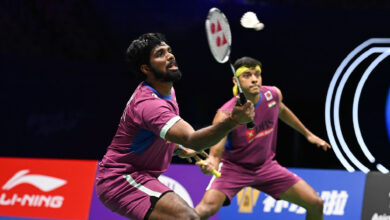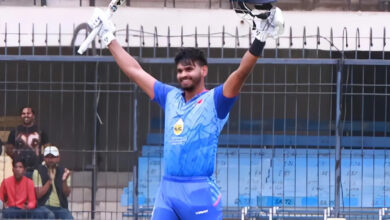China’s virtual show: Digital torchbearer lights flame, river flows inside stadium | Sports News

THEY COULDN’T hold the opening ceremony the river or the lake, so they brought the river and the lake to the Asian Games here on Saturday. And the evening that began with a whoosh ended with a silent flicker.China, the country believed to have given the world fireworks, shunned one of its most widely-used inventions for soundless, smokeless sparks in the ceremony that dazzled with digital creations and boundless imagination.
The 115-minute extravaganza, aesthetic and awe-inspiring, at the 81,000-seater Hangzhou Olympic Sports Centre Stadium saw augmented reality — rivers and waves, 3D stadiums and flying sports equipment, virtual torchbearers and people in the sky performing to traditional tunes.
Nothing captured the AI-driven nature of these Asian Games more than the lighting of the cauldron, the most coveted part of any opening ceremony. As the torch exchanged hands between China’s biggest sporting stars inside the stadium, a digital torchbearer — a culmination of a virtual relay in which over 105 million people participated — crisscrossed through the biggest Hangzhou landmarks before entering the stadium from the far end, circling it, and eventually lighting the flame.
China President Xi Jinping had earlier declared open the Games, postponed a year due to the pandemic. So over-prepared has China been for the Asiad that it held five dress rehearsals of the ceremony, with full-scale production and spectators in the stands.
Ironically though, when the day arrived, eight years after the city was awarded the event, the ceremony, whose central theme was water, was threatened rains. The organisers kept a smaller indoor venue on stand, ready to shift the entire extravaganza next door at a few hours’ notice in case it poured.
But the rain gods relented and the only droplets that drizzled were digital – millions of drops coming together to form a river, which then flowed to form tides on which boats sailed. Arts painted on them and poets sat on the edge, sipping the famous local tea, and seeking inspiration from the shimmering water body that flows through the city centre.
The ceremony, directed Chinese filmmakers Sha Xiaolan and Lu Chuan, was an ode to the city that holds near-mythical status in China, for its lakeside location as well as for being a spiritual retreat. They say that during the Southern Song period, poets and arts sought refuge on the banks of the tranquil West Lake and were held in high esteem.
These old relics may only be of symbolic value now, as Hangzhou has transformed into an ultra-modern, high-tech and cashless society. It’s at the centre of China’s tech revolution and AI creations.
All these elements — rivers and lakes, canals and bridges, poets and arts, and tech — were seamlessly integrated into a dazzling, artic show that was designed as much for the thousands inside the stadium as it was for the millions watching it on the television.
Even the otherwise drab athletes’ parade was full of symbolism.
At 8.15 pm on a breezy night, Tokyo Olympics medal-winning boxer Lovlina Borgohain and hockey captain Harmanpreet Singh led the Indian contingent out to a not-so-warm reception from a capacity crowd, amid a standoff between the two countries after three athletes from Arunachal Pradesh were denied accreditation cards and offered stapled visas instead for the Games.
It offered a glimpse into the welcome that awaits them over the next two weeks when they compete in 40 sports.
With their biggest-ever contingent of more than 650 athletes, India have set a lofty goal of winning 100 medals, which will require them to compete out of their skins. A bulk of Indian medals are expected from athletics, with hockey, shooting, badminton and archery among other potential medal-winning disciplines.
The wrestling crisis and a minefield of a draw in boxing, where Paris Olympics spots are at stake, make India’s chances in two combat sports they usually excel in look challenging.
Yet, it was difficult not to feel sanguine about India’s prospects when the contingent walked out.
Japan was the only other country that got the same response from the spectators as India. In sharp contrast to Afghanan, who were the first off the blocks and were welcomed with loud cheers, with 17 women athletes representing the country in a multi-discipline event for the first time since the Taliban took over.
North Korea marched out a little later, marking their return to international sports for the first time since the Covid-19 pandemic, their athletes receiving one of the warmest receptions along with Hong Kong – the packed stadium waved Chinese flags when the delegation walked out — and Pakan.Most Read
1
‘Surviving on bread, fighting for refunds’: Indian students in Canada struggle to find housing, food, jobs
2
Chandrayaan-3 mission: Dawn breaks on Moon, all eyes on lander, rover to wake up
See More
An even bigger roar was reserved for the Chinese Taipei contingent and it grew louder when the big screens inside the stadium showed Xi Jinping flashing a wide smile and clapping.
China emerged last, keeping in line with the Games tradition, and were greeted a deafening roar as world champion swimmer Qin Haiyang and basketball star Yang Liwei led the contingent out amidst high expectations of a record haul.
The first gold medal of the Games will be on offer on Sunday morning, in the calm waters of Fuyang, for rowing. And the hosts will hope to ride the wave.







